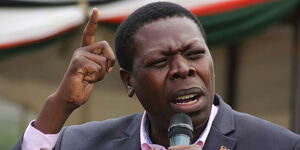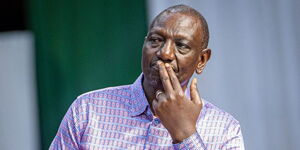The Independent Electoral and Boundaries Commission (IEBC) on Tuesday, August 9 warned Kenyans participating in the ongoing general election against sharing photos of marked ballot papers.
According to the statement issued by the electoral agency, sharing the ballot papers is unacceptable and is a violation of the law.
The commission further cautioned that those who flout the rule risk being punished, in accordance with the election laws.
“Voters are warned that violating the secrecy of the ballot through sharing of photos of marked ballot papers is punishable by law,” read a statement from IEBC.
Several social media users shared photos of their marked ballot papers on Tuesday morning. The users appeared to be displaying their preferred choices for the position of the president prompting the Wafula Chebukati-led team to respond.
According to the Election Offenses Act of 2016, a voter found guilty of contravening the secrecy of the ballot risks being fined Ksh1 million or imprisonment for three years.
“A voter who captures an image of any marked ballot for purposes of financial gain or for showing allegiance commits an offence.
“One is liable on conviction, to a fine not exceeding one million shillings or to imprisonment for a term not exceeding three years or to both,” states clause seven of the election offences act.
The Constitution of Kenya also stipulates that the election should be conducted through a secret ballot.
“The poll shall be taken by secret ballot on the day specified in Article 101 (1) at the time, in the places, and in the manner prescribed under an Act of Parliament,” reads Article 138 on the procedure for electing a president.
Besides sharing photos of the marked ballot papers, the law also prohibits any attempt by an individual to obtain information about the candidate a voter has voted for or is about to vote for.
Further, the Act on the offenses also states that disclosing the serial number of the ballot paper issued to any voter in a polling station is also illegal and could also attract a fine of Ksh1 million or a jail term of three years.
Other electoral offenses entrenched in the act include impersonation, voter bribery, and undue influence.
The warning by the IEBC comes amid isolated reported cases of alleged irregularities and anomalies in the country with a few confirmed arrests of suspected culprits.












